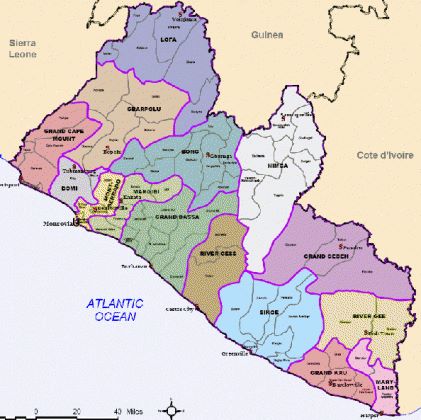The USAID Liberia Civil Society Activity (CSA) is collaborating with Accountability Lab Liberia (ALab) to enlist the private sector in supporting health and education projects implemented by civil society organizations in six counties.
On Friday, September 29, 2023, ALab and CSA hosted a one-day consultative introductory engagement at the Royal Grand Hotel with CSA’s health and education CSO-led coalitions and representatives from five companies: Orange Liberia, Western Cluster, Eco-Bank Liberia, ABEER Pharmacy, and Petro-Trade Liberia. The Liberia Chamber of Commerce and the Consortium of Business Development Service Providers of Liberia (CBDSPL) also attended.
The meeting provided networking opportunities between CSA’s coalition partners and the private sector with the goal of encouraging the private sector to support CSA’s interventions in the health and education sectors.
Since July, the two coalitions have been involved in creating awareness and advocating for accountability and transparency in the health and education sectors in Montserrado, Margibi, Grand Bassa, Bong, Nimba and Lofa counties.
Mr. W. Lawrence Yealue, II, ALab’s executive director, said his organization has had some experience engaging the private sector in supporting CSOs, especially around corporate and social responsibility outlined within the Mineral Development Agreement (MDA).
In August 2022, ALab conducted a mapping study of CSO funding streams in Montserrado, Margibi, Grand Bassa, Bong, Nimba and Lofa counties. The study identified local companies and diaspora organizations that can support CSO-led interventions in the education and health sectors.
“When donor funding dries out, we have to find alternative sources of funding for some of the critical issues that CSOs are working on,’ Yealue said. “Today might be the first conversation, but let’s have a bigger conversation; let’s make some tractable connections that we can build on.’’
The goal of the consultative engagement was to connect CSOs with the private sector, so they can begin engaging on how the two sectors can identify shared interests they both can support based on their strengths and expertise.
The health coalition advocacy is centered around three projects: Integration of Citizen Charters for Health Facility Development Committees; Drug Stock-out Mapping and Supply-Chain Management Advocacy; and Civil Society Advocacy and Monitoring of Revolving Drug Funds (RDFs).
The CSOs working on the health sector include CHESS-Liberia; include Public Health Initiative Liberia (PHIL); Youth Network for Positive Change (YOUNETPO); Efficient Research and Development Institute (ERDI); Humanity Above One-Self Foundation (HAOSF); Volunteers United for Development (VUD); Institute for Policy Evaluation and
Research (IPER); Institute for Research and Democratic Development (IREDD); and Rural Human Rights Activists Programme (RHRAP).
The education coalition, which is targeting 78 schools in six counties, is working on the following projects: Monitoring and Research/Investigation in Public School Registration Fees; Advocacy for PTA Guidelines for School Monitoring and Oversight; and Advocacy for the Establishment of Regional CSOs Legal Clinics/Assistance Centers.
Members of the education CSOs include Development Education Network (DEN-L); Institute for Democratic Action and Development (IDAD); Survivors AID International Liberia (SAIL); Youth Coalition for Education in Liberia (YOCEL); Institute for Research and Democratic Development (IREDD); Integrity Watch Liberia (IWL); Youth Movement for Collective Action (U-MOVEMENT); and the Institute for Policy Evaluation and Research (IPER).
Mr. Francis Kempeh, CSA’s Deputy Chief of Party, said CSA is working with civil society to advocate for policy reforms and service delivery. CSA developed the health and education coalitions based on findings from a Political Economic Analysis that identified health and education as priorities for citizens.
The two coalitions are empowering Parent Teachers Association to work effectively with school administration, monitoring, and research school registration fees; promoting transparency and accountability with the county councils; and establish legal clinics and assistance for CSOs to engage in advocacy for education policy reforms; and educate citizens that drugs and pharmaceutical products donated by the United States and other donors are free and not for sale.
“Everybody benefits when we invest in health and education,’ Kempeh said. “Investment in health and education increases employees’ productivity. There is a need for everybody to have a stake in meeting the development challenges in health and education.’’
Representatives from the private sector welcomed the meeting and expressed interest in learning more about CSO-led health and education projects. They also raised concerns about accountability and transparency of how CSOs are managing the funds they receive.
Mr. James K. Tarpeh, Government Liaison Officer for the Western Cluster, said, one possible area of collaboration could be around the implementation of the MDA, using Social Development Funds to address critical health and education challenges in the western region.
“We would like to work with CSOs to do activities that will benefit the community,’ Tarpeh said. “We just need to know what these CSOs are doing, so we can support them. We are also interested in how effectively they are managing the money we give them. CSOs need to be honest.’’
Mr. Eric Clarke, Corporate Sales Manager for Orange Money, said the private sector is willing to work with CSOs, but accountability and transparency is a major concern.
“Orange will not just give out money,’ he said. “We get a lot of letters for sponsorship, but accountability is a problem. We want to look at organizations that are having an impact. We are open to on-on-one engagements with CSOs to see how we can be of value.’’
The CSOs thanked USAID CSA and ALab for the initiative and said they look forward to continuing the engagement with the private sector.
“This was an eyeopener,’ said Mrs. Miatta Tarpeh, Gender Inclusion Officer at SAIL. “We now see that the private sector could be our donors.’’
CSA is in the third year of a five-year program funded by the United States Agency for International Development (USAID) implemented by DAI Global, LLC (DAI) . CSA’s goal is to advocate for policy reforms, policy implementation, and service delivery improvements through multi-stakeholder coalitions that build feedback loops among the government of Liberia, CSOs, the private sector and citizens.

